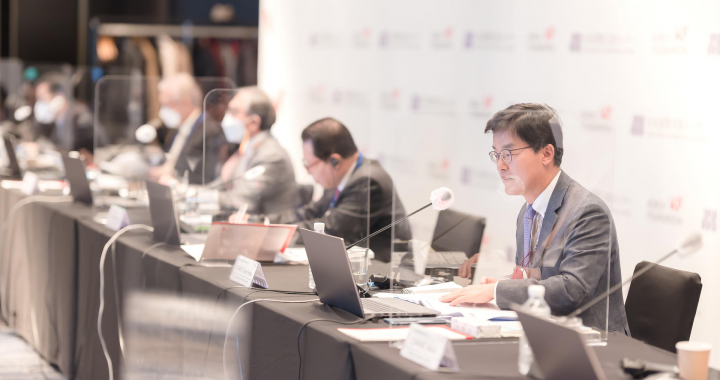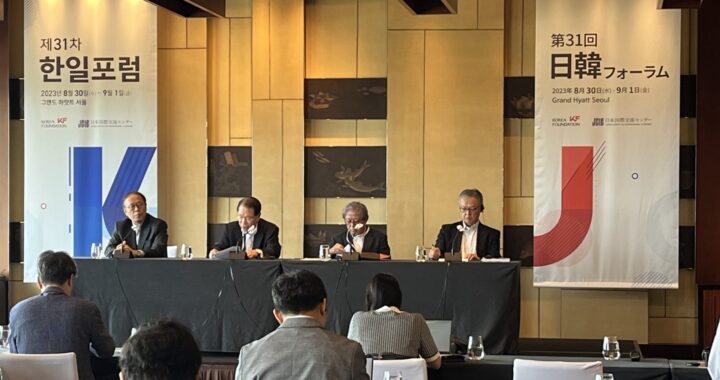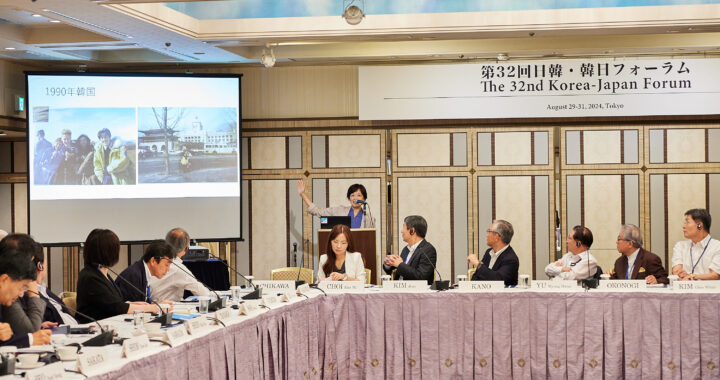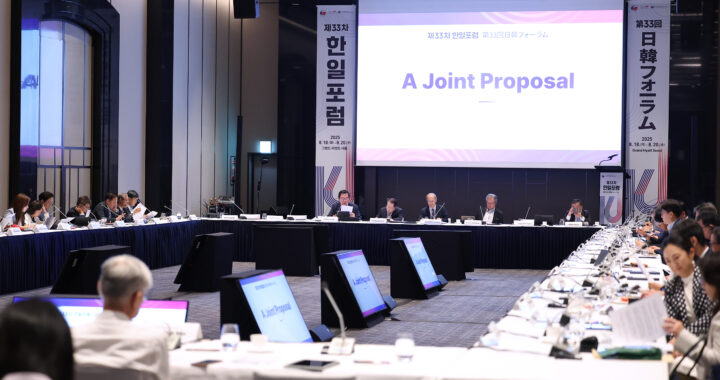Japan-Korea Forum | 29th Meeting

The 29th Japan-Korea Forum, held online, brought together participants to discuss domestic political shifts and bilateral relations, economic and technology cooperation, and the latest geopolitical developments in the Indo-Pacific. The event also featured a Junior Forum and the Korea-Japan Forum Award Ceremony.
Japan-Korea Forum | 31st Meeting

The 31st Japan-Korea Forum, held in Seoul, brought together participants to discuss domestic political shifts and bilateral relations, economic and security issues facing the two countries, and the latest geopolitical developments in East Asia. The event also featured a Junior Forum for youths from the two countries. The 8th Japan-Korea Forum Award was also held to celebrate those to made significant contributions to Japan-Korea friendship and development.
Japan-Korea Forum | 32nd Meeting

The 32nd Japan-Korea Forum, held in Tokyo, brought together participants to discuss domestic political shifts and bilateral relations, economic and security issues facing the two countries, and the latest geopolitical developments in East Asia. They also looked at civil society and youth exchange as critical keys to the future of bilateral ties. The event also featured a Junior Forum for youths from the two countries.
Japan-Korea Forum | 33rd Meeting

The 33rd Japan-Korea Forum, held in Seoul, brought leaders from various sectors together to discuss the current political climate and bilateral relations, the state of Northeast Asia and Japan–Korea cooperation in the era of the second Trump administration, and the implications of global economic realignment for future economic collaboration. The program featured a special session marking the 60th anniversary of the normalization of diplomatic relations. It also featured a Junior Forum for youths from the two countries.
Japan-Korea Forum | 18th Meeting

On October 3-5, 2010, the 18th Japan-Korea Forum took place. Approximately 40 leaders from the political, nonprofit, academic, media, and corporate sectors gathered to discuss a variety of topics, including socio-political developments in both countries, the changing economic environment in Northeast Asia and the future of Korea-Japan economic cooperation, and regional security issues.
Japan-Korea Forum | 10th Meeting

On September 6-8, 2002, the tenth meeting of the Forum took place in Kanazawa, Japan. Over 40 leaders from the political, nonprofit, academic, media, and corporate sectors gathered to discuss a variety of topics, including Korea-Japan exchange and cooperation after the 2002 World Cup, sociopolitical and economic developments in both countries, the future of Korea-Japan economic cooperation, and the rise of China and the future of the Asia Pacific region.
Japan-Korea Forum | 11th Meeting

On August 31–September 2, 2003, the 11th Japan-Korea Forum took place in Gyeongju, Korea. Approximately 40 leaders from the political, nonprofit, academic, media, and corporate sectors gathered to discuss socio-political developments in both countries, the changing economic environment in Northeast Asia and the future of Korea-Japan economic cooperation, and regional security issues. They also discussed the promotion of bilateral exchange and cooperation in anticipation of the upcoming 40th anniversary of the normalization of Korea-Japan diplomatic relations.
Japan-Korea Forum | 12th Meeting

On September 13-15, 2004, the 12th Japan-Korea Forum took place in Gyeongju, Korea. Approximately 40 leaders from the political, nonprofit, academic, media, and corporate sectors gathered to discuss a variety of topics, including socio-political developments in both countries, the changing economic environment in Northeast Asia and the future of Korea-Japan economic cooperation, and regional security issues.
Japan-Korea Forum | 13th Meeting

Forty-one political leaders, business executives, scholars, and public intellectuals gathered from August 29 to 31 for the 13th Japan-Korea Forum on Jeju Island, Korea, to discuss political trends in Japan and Korea, bilateral history issues, Korea-Japan cooperation on East Asia community building, and measures to promote greater exchange between the two countries.
Japan-Korea Forum | 14th Meeting

On August 29-31, 2006, the 14th Japan-Korea Forum took place. Approximately 40 leaders from the political, nonprofit, academic, media, and corporate sectors gathered to discuss a variety of topics, including socio-political developments in both countries, the changing economic environment in Northeast Asia and the future of Korea-Japan economic cooperation, and regional security issues.
